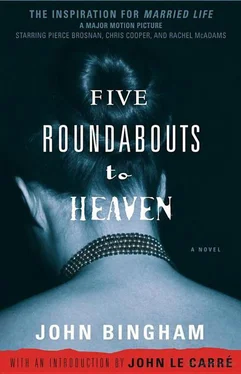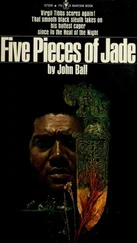John Bingham - Five Roundabouts to Heaven
Здесь есть возможность читать онлайн «John Bingham - Five Roundabouts to Heaven» весь текст электронной книги совершенно бесплатно (целиком полную версию без сокращений). В некоторых случаях можно слушать аудио, скачать через торрент в формате fb2 и присутствует краткое содержание. Жанр: Криминальный детектив, на английском языке. Описание произведения, (предисловие) а так же отзывы посетителей доступны на портале библиотеки ЛибКат.
- Название:Five Roundabouts to Heaven
- Автор:
- Жанр:
- Год:неизвестен
- ISBN:нет данных
- Рейтинг книги:4 / 5. Голосов: 1
-
Избранное:Добавить в избранное
- Отзывы:
-
Ваша оценка:
- 80
- 1
- 2
- 3
- 4
- 5
Five Roundabouts to Heaven: краткое содержание, описание и аннотация
Предлагаем к чтению аннотацию, описание, краткое содержание или предисловие (зависит от того, что написал сам автор книги «Five Roundabouts to Heaven»). Если вы не нашли необходимую информацию о книге — напишите в комментариях, мы постараемся отыскать её.
Five Roundabouts to Heaven — читать онлайн бесплатно полную книгу (весь текст) целиком
Ниже представлен текст книги, разбитый по страницам. Система сохранения места последней прочитанной страницы, позволяет с удобством читать онлайн бесплатно книгу «Five Roundabouts to Heaven», без необходимости каждый раз заново искать на чём Вы остановились. Поставьте закладку, и сможете в любой момент перейти на страницу, на которой закончили чтение.
Интервал:
Закладка:
Bartels waited, biding his time until Beatrice should comment on the play. She poured out the tea and handed him his cup, and sat sipping her tea and looking into the fire. Five minutes passed, and he began to think that the opportunity for which he was waiting would not arise.
He sought in his mind for some method of approaching the subject. Now that the moment was near, he felt sad and nervous, as he always did at the thought of inflicting pain or distress.
Then, suddenly, Beatrice spoke about the play.
“I just don’t believe in this grand passion, this all-devouring flame which people are always writing about,” she said irritably. “It may occur in one case in a million, but I simply don’t believe it holds true for the normal run of people, I just don’t believe it.”
She sat in her armchair, stirring her tea, and looking into the fire.
It was her old line of argument, brought out and hacked around to all sorts and conditions of people; it was her attempt to justify to herself her actions in having married without being in love; an attempt to reassure herself that other people, or the vast majority, also married with their heads rather than their hearts, as she had done, as she would do again if she were widowed; that other people, therefore, had no fuller an emotional life than she had.
But that evening she seemed not to be content to let the matter stand. She seemed to be seeking an assurance from Bartels himself that she was right.
She said hopefully:
“Don’t you think I’m right, Barty? Don’t you think it’s true that people see this love-stuff through a kind of rosy mist of self-deception?”
Bartels took a deep breath. “No, I don’t,” he said flatly. “I believe in love.”
Beatrice reached to take a cigarette from a small table at her side. The lamplight fell on her red hair and fair complexion. She looked young and soft and, because she spoke in a low voice, somehow defenceless. But Bartels, hardening his heart, said:
“You think as you do, because you have not met the right man, yet.”
“Perhaps I’m not made like other women,” she replied hopelessly. “I don’t know. I can’t feel this great overwhelming passion which people call love. I just can’t feel it about any man.”
Bartels said again, dully: “That’s because you have not met the right man. If you met the right man, you would feel it.”
But she shook her head. “I can’t give the adulation, the worship, the adoration, because I don’t feel it. It’s not in me to give it to any man. I can’t help it. That’s the way I am. I can feel physical passion, affection, comradeship, but that’s all.”
“When you are in love,” said Bartels, “you want to give, to protect, and to cherish, too. But above all you want to give.”
“That, to me, is a form of magic in which I don’t believe.”
Bartels said: “Magic? Yes, it’s magic all right. A formation of the eyes, a half-smile, the carriage of the head, each of these things can bring about love. It’s magic all right. But a common enough type.”
“To me love means one thing.”
“What is that?”
“Sex.”
“Bed?”
“Bed,” said Beatrice. “All the rest of it, the romantic dreams, the self-deception, what you call the wish to give and give, it all boils down to that. Bed. Love means bed. The rest is comradeship.”
Even Bartels had never before heard her express such a disillusioning opinion. He was shocked and amazed. He shook his head.
“You’re wrong,” he said, gently. “You’re utterly wrong.”
He felt an urgent wish to convince her that she was on the wrong track. It astonished and dismayed him that she should persist in this way of thinking.
Suddenly, unpredictable as she so often was, she said:
“But I do love you, in my own way. I do, really.”
“Do you?” He smiled affectionately at her. “Perhaps you do.”
“Only I can’t think anybody wonderful, because I try to see people with what I believe are the eyes of truth.”
“Why?” asked Bartels quickly. “Why force it on yourself? Why be so practical? Why not live with a little fantasy, if it helps?”
“I can’t.”
“Why not?” persisted Bartels. “Why can’t you?”
“Perhaps because I believe that truth, reality, is the most important thing in the world. It’s not easy. It involves being truthful with yourself, and that’s difficult. I try to be truthful with myself.”
“I think you succeed. Sometimes disastrously so.”
The little clock on the mantelpiece struck eleven, musically, harmoniously. Bartels felt cool and level-headed now, alert and vigilant, poised to strike the blow which he had planned. With a conscious effort he excluded any emotion from his mind, any pity from his heart.
He heard Beatrice say: “You should have married a different woman, Barty. I love you, but it’s not what you mean by love. You should have married a softer, more effeminate woman than me. The thing you need most, I can’t give you. I try hard, but I can’t. That’s the tragedy of it. But I’ve given you everything I could. I’ve tried to be a good wife to you.”
“You’ve succeeded in being a good wife.”
Was there any harm in conceding that? he wondered. It was her just due. She had been an excellent housekeeper, a good lover; she had encouraged him in bad times. She had given him loyalty and comradeship.
For the second time that day, he thought: She’s like a fine mosaic, but for me the centrepiece is missing. It wouldn’t have mattered for ninety-nine men out of a hundred, but it matters to me. It’s her bad luck that I should be as I am. It’s just her bad luck.
“I’ve not succeeded,” said Beatrice, “I’ve failed. Perhaps not through my own fault, but I’ve failed because I have not given you what you want.”
Now, thought Bartels, shall I tell her now? For a moment the words rested heavily upon his tongue, but instead of speaking them he said:
“It is always risky for a woman whose heart is ruled by her head to marry a man whose head is ruled by his heart. I am as much, or as little, to blame as you. It’s just one of those things. You’ve done a lot for me,” he added.
“Have I?” asked Beatrice. “I wonder.”
“But a woman who does a lot for a man can pay a heavy price.”
Beatrice looked up. “Meaning what?”
Bartels reached forward and stroked the dog’s head. “Oh, it’s all rather complicated. Let’s skip it. Can I have another cup of tea, please?”
He knew there was a risk that she might agree to drop the subject, but, understanding her, he reckoned it was a remote one. She took his cup and filled it and said: “What is the price she pays? Tell me.”
“Let’s skip it,” he said again.
“No, tell me. Go on.” She handed him back his cup of tea, and looked at him expectantly.
“Well, I think a woman is often like a thrush with a snail. She hops along, sees a man, pauses, listens, considers, head on one side, and then dashes him out of his protective shell and swallows him.
“A woman will knock a man into some semblance of order, cajoling, pleading, using every ounce of her personality, until she has moulded him into the shape she thinks is good for him. Then she sits back to enjoy the fruits of her labours. But she forgets the price she has had to pay: the blanketing out of his personality, the smothering process which has to be gone through.
“If he falls for another woman, she is surprised and hurt.
“She sees him as he was, and she sees him as she made him, a better finished product altogether. A product which another woman is now going to enjoy. I will agree with you that it is very trying for her.”
Beatrice sat with her hands folded in her lap, looking down at them, saying nothing. Bartels thought she was summoning her thoughts for a counterattack, a final showdown. This was what he was prepared for. This was what he hoped for. Instead, she spoke quite quietly.
Читать дальшеИнтервал:
Закладка:
Похожие книги на «Five Roundabouts to Heaven»
Представляем Вашему вниманию похожие книги на «Five Roundabouts to Heaven» списком для выбора. Мы отобрали схожую по названию и смыслу литературу в надежде предоставить читателям больше вариантов отыскать новые, интересные, ещё непрочитанные произведения.
Обсуждение, отзывы о книге «Five Roundabouts to Heaven» и просто собственные мнения читателей. Оставьте ваши комментарии, напишите, что Вы думаете о произведении, его смысле или главных героях. Укажите что конкретно понравилось, а что нет, и почему Вы так считаете.












